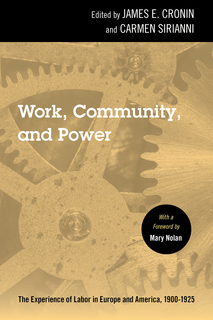Work, Community, and Power
The Experience of Labor in Europe and America, 1900-1925
Edited by James E. Cronin and Carmen Sirianni
With a Foreword by Mary Nolan
The first quarter of the twentieth century was perhaps the most dramatic and consequential period for the international working class. Corporate control was consolidated and centralized. The workplace began to be extensively reorganized by Taylorist and later Fordist methods. Revolutions, factory occupations, and new forms of workers' control and industrial democracy followed in the wake of World War I. Revolutionary industrial unionism challenged previous organizations, and new communist parties contended with Social Democracy for the political allegiance of the working classes. In this crucible of struggle and social transformation, many of the most influential political and social theories were forged: not only those of Lenin and Kautsky, but also Gramsci and Lukacs, Korsch and Austro-Maxism, Michel and Weber. The meaning of both democracy and socialism has remained contested ever since.
The comparative and case studies in this collection offer a major reinterpretation of this crucial period in working class history in the United States, Europe, and Soviet Russia. They combine recent interests of historians and social scientists in the labor process, social history "from the bottom up," the mobilization of social movements, the world system and international state competition with more traditional concerns about organization, theory and politics.
Table of Contents
Metadata
- isbn9781439917602
- publisherTemple University Press
- publisher placePhiladelphia, PA
- restrictionsCC-BY-NC-ND
- rightsCopyright © 1983 by Temple University—Of The Commonwealth System of Higher Education
First published 1983. Reissued 2018.


